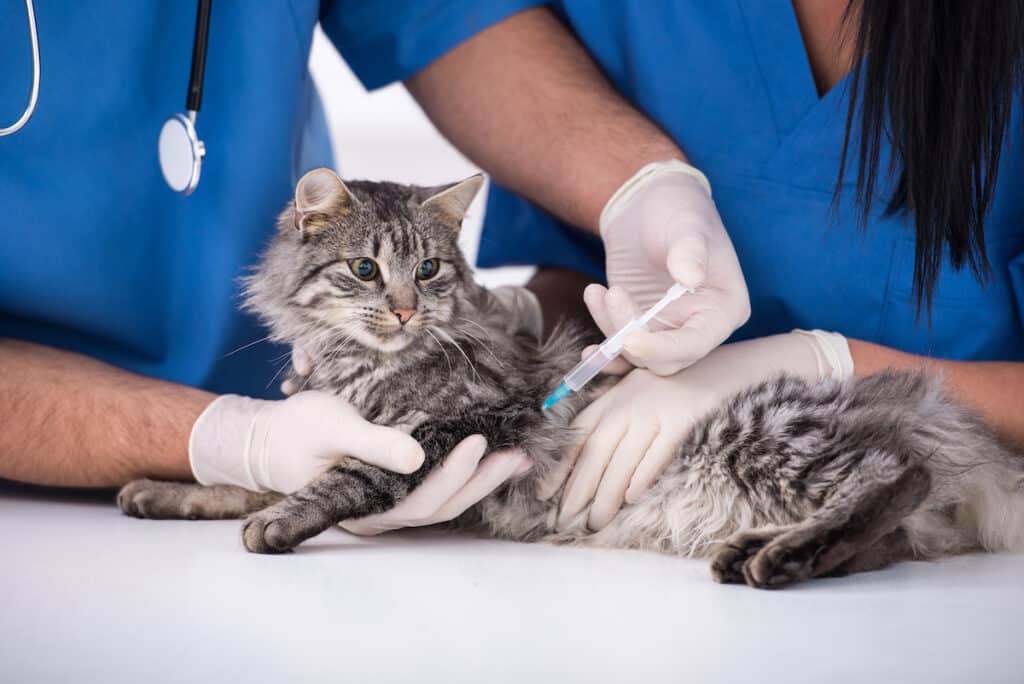The Importance of Cat Vaccinations
Getting a cat vaccination is a great way to protect your feline friend from infectious and potentially fatal diseases. These shots can also protect your cat from diseases that can be transmitted from other animals.
Types of Cat Vaccines:
Distemper shots
Vaccinations are a great way to protect cats from many diseases. They can also decrease the severity of upper respiratory infections, which are common in cats. In general, adult cats need shots once a year, while kittens need to be vaccinated as soon as they are six to eight weeks old. However, the proper time to vaccinate depends on the health of your cat.
Most cats can be vaccinated with a feline distemper vaccine. It is often administered as part of a three-in-one combination vaccine that includes calicivirus and feline viral rhinotracheitis vaccines.
The feline distemper virus is a fast-moving, highly infectious virus that causes severe infections in cats. This disease can be life-threatening, especially for kittens. If not treated, your cat may die without warning. It can also cause diarrhea, gastrointestinal problems, and loss of appetite.
Feline leukemia
Vaccinating cats for feline leukemia is an important part of a comprehensive preventative health care program. The vaccine works by building up a cat’s immune system against the virus. While the vaccine is not a perfect system, it is one of the best ways to decrease a cat’s chances of contracting the disease.
Feline leukemia vaccines come in two forms. The first is a traditional needle vaccine. The other is a less invasive skin-transmitting vaccine. Both can be administered to a cat at any age.
While the Feline Leukemia Virus (FeLV) is not a life-threatening disease, it can affect your cat’s health in many ways. The virus affects the blood, skin, and digestive tract. In addition, it can cause chronic respiratory infections and mouth and gum infections.
The best way to prevent feline leukemia is to avoid allowing your cat to come into contact with the virus. Aside from vaccinating your cat, it is also important to keep your cat indoors, as well as minimizing your cat’s exposure to other cats.
Rabies
Vaccinating your cat against rabies is important for your pet’s health as well as yours. Rabies is a disease that is fatal for all mammals and can pose serious risks to humans.
Cats can become infected with rabies through a bite from an infected animal. In North America, foxes and bats are the most common carriers. They can carry the virus into your home.
Cats can be vaccinated as young as six weeks, but they need to receive a booster vaccine at least once a year. Adult cats need to be re-vaccinated every three years.
The rabies vaccine is very effective. In most cases, it’s unlikely that your cat will suffer a serious reaction. But if he does, your veterinarian can prescribe antihistamine to relieve the symptoms.
If your cat develops a serious reaction, he may require supportive care such as oxygen, intravenous fluids, and close monitoring of his vital signs. He may also need anti-inflammatory medication.
Feline parvovirus
Vaccination is very important to keep cats healthy. There are many infectious diseases that can affect cats. For example, Feline Panleukopenia and Feline Distemper both are very contagious and can cause very bad symptoms in cats. These diseases can be fatal if they are not treated. It is important to have your cat vaccinated for both of these diseases.
Feline panleukopenia is a serious viral disease that affects kittens. It causes anorexia, depression, dehydration, diarrhea, and bacterial infection in the intestines. This disease can also affect adult cats.
Feline panleukopenia virus is not a new disease, but it is becoming increasingly prevalent in unvaccinated populations. It is one of the diseases that veterinarians see most often in shelters. The disease is not as deadly as it once was, but it is still a very serious illness.
Feline herpesvirus type I
Vaccines against feline herpesvirus type I are recommended for all cats. Feline herpesvirus type I (FHV-1) is a member of the alphaherpesvirinae family and can cause severe upper respiratory problems. The virus is also transmitted by direct contact with infected cat secretions and objects. Symptoms include fever, conjunctivitis, and pneumonia. The disease is not curable but can be managed.
The FeHV-1 virus replicates in epithelial cells of the respiratory tract. It is also present in the conjunctiva and tonsils. It can cause upper respiratory infection, pneumonia, and eye diseases in cats. Some cats can become chronic carriers of the disease.
Vaccinations against FHV type I have not proved to be effective in curtailing the establishment of latency. Acute reactivation of latency is possible under certain conditions. Environmental, physiological, and chemical stressors can induce reactivation.














